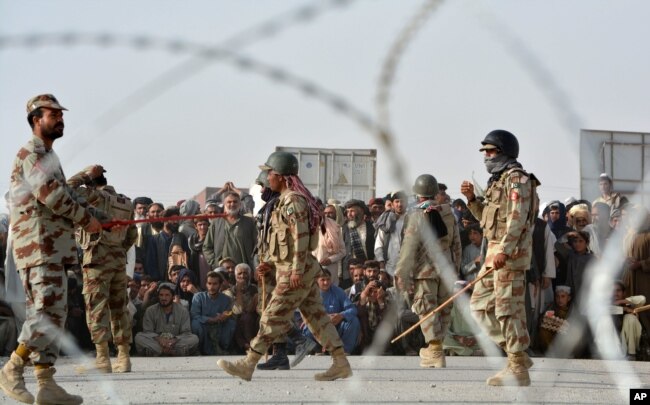Ayaz Gul
 FILE - Afghan Foreign Minister Salahuddin Rabbani (R) talks with Pakistan's National Security Adviser Sartaj Aziz (L) during a meeting in Islamabad, Pakistan, August 13, 2015. The sides have expressed readiness to meet on the sidelines of a regional summit opening in Islamabad Sunday.
FILE - Afghan Foreign Minister Salahuddin Rabbani (R) talks with Pakistan's National Security Adviser Sartaj Aziz (L) during a meeting in Islamabad, Pakistan, August 13, 2015. The sides have expressed readiness to meet on the sidelines of a regional summit opening in Islamabad Sunday.
Pakistan disclosed Saturday that it is engaged in negotiations with Afghanistan on developing a joint “mechanism” to address mutual cross-border terrorism concerns, and both sides could formalize a deal next week.
Sartaj Aziz, the prime minister’s adviser on foreign policy, told reporters in Islamabad that he will hold further talks on the subject when he meets with Afghan Foreign Minister Salahuddin Rabbani on the sidelines of a regional summit opening in Islamabad on Sunday.
He said that Rabbani has confirmed his participation in the 10-nation Economic Cooperation Organization, or ECO, along with other senior Afghan officials.
Aziz went on to say that both sides see terrorism as a “common enemy” and have agreed that there is a need for cooperation.
“For this purpose, we are holding discussions on developing a mechanism at various levels such as ground level, higher military level, intelligence level, political level, foreign office level. We [Pakistan] have already sent them our proposals and if they [Afghanistan] agree to it, I am hopeful it [the agreement] will be formalized during the [ECO] summit,” the adviser said.
 FILE - People wait to cross into Afghanistan at the Pakistani border post Chaman, Sept. 1, 2016. A recent spate of cross-border terrorist attacks have resulted in renewed restrictions on the frontier between the two countries.
FILE - People wait to cross into Afghanistan at the Pakistani border post Chaman, Sept. 1, 2016. A recent spate of cross-border terrorist attacks have resulted in renewed restrictions on the frontier between the two countries.
Mutual accusations
Bilateral relations have plunged to new lows in recent months with Islamabad and Kabul accusing each other of harboring anti-state militant groups and sponsoring terrorist attacks on their respective soils.
Pakistan and Afghanistan share a 2,600 kilometer, largely porous border.
Tensions worsened this month when Pakistani leaders blamed militants sheltering on the Afghan side for a series of suicide bombings and other attacks across the country that killed scores of people.
The military also handed over a list of 76 militant leaders to the Afghan government following the bloodshed and demanded swift action against them and their extradition to Pakistan.
Kabul rejected the charges and instead provided Islamabad with its own list of 85 militant leaders as well as 32 terrorist training centers that the Afghan government alleged are based in Pakistan and plotting violence against Afghanistan.
The Afghan Foreign Ministry, while responding to a Pakistani list of suspected fugitive terrorists, has said that it was ready to look into it and expected Islamabad to also go after militants wanted by Kabul.
Pakistan has also sealed all its border crossings with Afghanistan since the wave of terrorist attacks hit the country two weeks ago. Foreign policy adviser Aziz, while speaking on Saturday, expressed hope the border would be reopened soon.
No comments:
Post a Comment